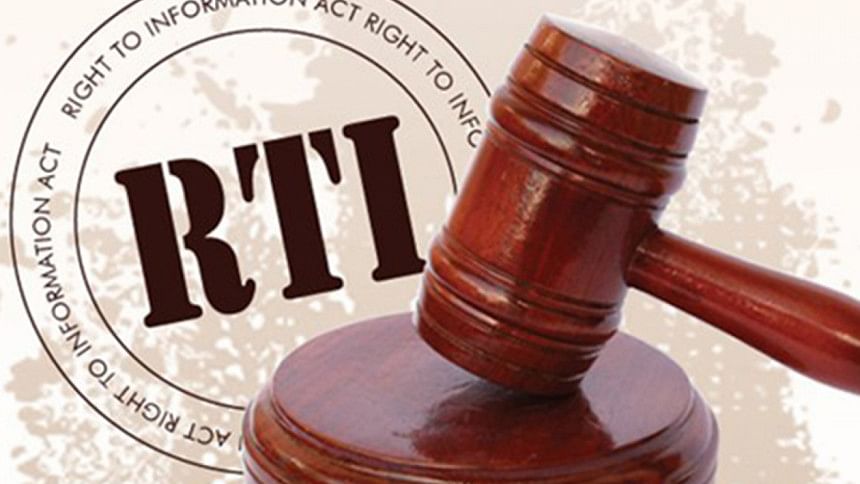Eight years old - How is the Right to Information Act faring?

"The freedom of a nation cannot be upheld by laws alone, but also by the light of the nation and knowledge of their use." These words by Anders Chydenius, a Swedish enlightenment thinker and politician of the eighteenth century, had set the ball rolling for the adoption of world's first freedom of information law in Sweden and Finland in 1766. Since then around 115 countries/territories have enacted similar transparency laws.
The Bangladesh Right to Information Act (RTI) 2009 was inspired by the same objective of empowering citizens with the right to know how the government exercises its authority under the laws of the land. On July 1, 2017, it completed eight years since it became operational with the establishment of the Information Commission of Bangladesh.
The anniversary provides a good occasion to assess how the law itself and the Information Commission have fared over the years. The exercise is equally important in relation to the implementation of Sustainable Development Goals (SDG) 2030, of which RTI is an integral part. To obtain a good rating when Bangladesh's RTI use is measured against international standards, we must identify the shortfalls and mend them quickly.
We can base our assessment on the Information Commission's Annual Report 2016, combined with the perspectives of individual users of the law, activists engaged in its promotion and media reports and emerging literature on the subject.
The speech delivered by the Honourable President of the country on "International Right to Information Day" last year indicates support to the RTI Act from the highest level of government: "Having or not having the right information is like living under light or darkness. Just as light shows the path to human wellbeing and progress, right information helps citizens to claim their legitimate rights and dispel corruption and unfair practices from society. Contrarily, darkness promotes misfortune and spreads corruption."
Is the Information Commission living up to the claims of the government and the expectations of the people?
The Annual Report shows that in 2016, some 6,369 requests for information were made to public authorities. Of these, over 95 percent were provided with the information sought.
539 complaints were lodged with the Information Commission by disgruntled information seekers. Of these, 364 were accepted for hearing. The rest were either rejected for faulty submissions or decided without a hearing.
From 2010, the first year of the law, the number of requests for information declined from 25,401 to 6,181 in 2015. Altogether, some 82,412 RTI applications were recorded in eight years. One may ask if this is a respectable figure for a country of over 160 million people.
A quick comparison with our two giant neighbours, India and China, may help. In 2015-16, some 1.2 million RTI requests were entertained by public authorities under the central government of India alone, of which 94 percent received positive responses. During the same period 106,556 appeals and complaints were resolved by the Central Information Commission (CIC). The numbers would be much higher for the entire country if State figures were added.
For China, the available figure was 1.5 million for the year 2011. Of these 85 percent resulted in disclosure. Who would have thought that a transparency law would work under a totalitarian system?
Lest readers attribute the large numbers to population sizes, the following figures from countries with lesser populations than Bangladesh may help. The UK FOI requests in 2016 numbered 45,415. The figure for Australia for 2015-16 is 37,996. It shows that population size does not determine use.
It would be simplistic to claim that the Bangladesh Act is failing. A transparency regime, by nature, makes slow progress. It takes a long time to break away from a deep-rooted culture of official secrecy and change people's mindset forged over centuries.
A more constructive position would be to check if we are going in the right direction and if corrective measures may change the situation. Some positive indications are available from the Annual Report, including the following:
The list of issues on which RTI requests were made in 2016 show a growing maturity of users. Many more requests now relate to public interest and transparency/accountability issues, and not simply to personal needs.
The overwhelming use of the law by marginalised communities is slowly giving way to more users from the middle and educated classes. More requests are now made to Central Ministries and authorities, departing from the earlier focus on local bodies.
The emergence of a breed of passionate RTI users, named in the Annual Report, is another notable development.
The Designated Officials (DOs) appear to be less likely to get away by falsely claiming at complaint hearings that the RTI requests never reached them.
The Information Commission is slowly moving towards making greater use of penalties on defaulting DOs. Seven DOs were fined in 2016 alone, which is more than 50 percent of the total of 12 imposed till then.
Written decisions by the Information Commission on complaint hearings are in many cases better reasoned and articulated. It indicates evolution of a good jurisprudence.
Let us also pay heed to less encouraging trends so that we may address them.
The practice of rejecting complaints on procedural grounds continues to be a key factor impacting negatively on prospective applicants. The Annual Report shows that 70 out of 175 complaints (40 percent), rejected by the Information Commission was because applications/appeals were not addressed to the right persons.
The non-appointment of DOs, or their non-replacement upon transfer, is linked to the above factor. So far around 24,103 DOs have been appointed against a possible figure of 39,000 for the whole country. Where would applicants go when no DOs are appointed or the authorities disregard the directives of the Information Commission to appoint them?
The time taken by the Information Commission to resolve complaints sometimes exceed the legal limit of 75 days by many times. It is known to postpone or reschedule hearings frequently at the urging of powerful authorities. This causes much frustrations, lengthy delays, increased expenses and undue suffering to ordinary complainants.
The practice of resorting to one-party hearing by the Information Commission to resolve complaints disappoints users who find it contrary to basic principles of justice.
A growing practice of the Information Commission to declare a complaint to be "sub judice", if a writ petition on a similar claim remains pending in the High Court, is another source of frustration. Many complaints are kept hanging on this ground though clear precedents exist.
We hope that this analysis of the implementation of RTI in the country would help all concerned—the government, the Information Commission and citizens—to appreciate that the potential of the law can only be achieved through their combined efforts. While there are reasons to worry about the low use of the law, there are also some gleams of hope.
The government must provide the necessary moral and ancillary support to help the Information Commission undertake the required corrective measures. It should ensure inclusion of legal expertise in future composition of the Commission. On its part, the Commission must strive to win back citizen's trust by earnestly removing all impediments in the use of the law and setting examples of its own transparency and accountability. This should enhance growth.
Let us keep in mind that "there is not a crime, there is not a dodge, there is not a trick, there is not a swindle, there is not a vice which does not live by secrecy." (Joseph Pulitzer). Together, we can pierce the veil of secrecy from the work of public offices. It would strengthen our democracy and promote good governance.
Shamsul Bari and Ruhi Naz are Chairman and Project Coordinator (RTI section) respectively of Research Initiatives, Bangladesh (RIB). E-mail: [email protected]

 For all latest news, follow The Daily Star's Google News channel.
For all latest news, follow The Daily Star's Google News channel. 








Comments